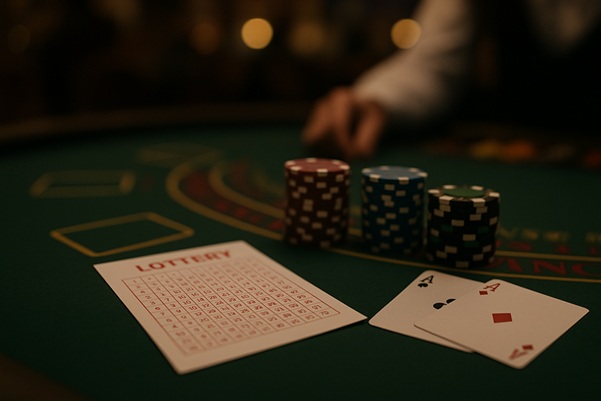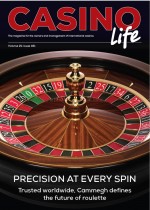
The dream of instant wealth has long divided players into two camps: those who buy a ticket for the faint chance of overnight fortune, and those who sit down at casino tables seeking steady returns from familiar games. Americans continue to prove which side dominates. In 2024, they spent $113.3 billion on lottery tickets, nearly twice the $49.8 billion casinos kept from slots and tables.
When numbers this large tilt so heavily toward the lottery, the imbalance shows how people are drawn more to hope than to math. That preference explains why improbable jackpots outshine the measurable percentages that govern casino play, and why psychology, not probability, decides where most money goes
Chasing Lightning Strikes
The lottery is presented as a game of chance but its real force lies in the fantasy it sells. Each promise of wealth comes wrapped in astronomical odds that make fulfillment almost impossible.
Each ticket is purchased with the hope that improbable numbers will fall into place and turn a few dollars into a life-changing fortune. Players know the probability is not high, yet the chance of sudden transformation is enough to keep tickets moving by the billions.
The attraction of a lottery ticket lies in the dream of one-off fortune, whereas players who turn to regulated platforms such as those in this list of the best Georgia online casinos, or comparable guides in other countries, are drawn by steady advantages like broader game choice, promotional rewards, and fast access to winnings that reinforce ongoing play rather than a single unlikely jackpot. This difference sets the stage for understanding how two forms of play cater to opposite instincts: fantasy versus calculation.
The Psychology of Overweighting Odds
While the lottery mentality looks irrational on the surface, decades of behavioral research help explain why it persists. Psychologists explained this bias through prospect theory, a decades-old study of decision-making that shows how people consistently overweight small probabilities and underweight likely outcomes because rare jackpots stir more emotion and hope than steady, ordinary gains. That very mindset keeps lottery tickets selling despite the math.
This preference explains why spending on lotteries dwarfs the casino industry. A one-in-hundreds-of-millions chance still excites people more than a game where outcomes are predictable and the edge is visible. The prospect of a singular, life-altering win is emotionally stronger than the knowledge that returns will almost always be negative.
Inside casinos, the focus turns toward calculation, with players known as grinders concentrating on odds, expected value, and the weight of repetition. To them, consistency matters more than chasing miracles, and the logic of probability carries greater weight than the emotional lure of improbable jackpots.
Where Casinos Stand Apart
Not relying on pure chance, casino economics are built on scale rather than jackpot spectacle. The model depends on millions of small wagers played out continuously, each governed by a mathematical edge that ensures the house collects a slice of every dollar.
According to recent casino slots data, which comes from official Nevada Gaming Control Board reports and is presented by U.S. gambling research outlets, slot machines held an average of 7.2% in 2024. The figure makes clear that casinos earn not from rare windfalls but from a steady margin applied again and again, which is a model that rewards consistency rather than chance.
That margin means players collectively receive about 92.8% of wagers back as winnings, but because they re-bet those returns, the cycle favors the house in the long run. So, by calculation, even a payout rate above 90% leads to loss should the math be allowed to repeat without end.
Grinders who understand expected value recognize this. The difference is not in beating the house, which is something few achieve, but in learning how to stretch play, manage losses, and leverage skill in games like poker or blackjack where probabilities can be influenced by decision-making.
Billions Through Consistency
At industry level, the repetition of small margins produces staggering sums. Every spin, hand, or roll contributes to a collective pool that casinos transform into predictable revenue streams.
Nevada’s record gaming revenue of $15.6 billion in 2024 illustrates how the steady margins discussed earlier scale up when measured across an entire state. The figure confirms that reliability, not volatility, drives the health of the casino sector.
Nationally, commercial casinos produced almost $72 billion in 2024. While the lottery absorbs more raw spending, casino income demonstrates a different kind of stability one that rests on the certainty of percentages repeating endlessly rather than the slim chance of an extraordinary prize.
What Winning Really Means
When narrowed to the player’s perspective, the definition of a win changes dramatically between the lottery and the casino. For lottery buyers, victory means overcoming astronomical odds to seize a jackpot that changes their life. The attraction lies not in regular play but in the hope that one purchase might be the ticket.
In casinos, winning is often smaller and more frequent. A good run at a slot or a favorable streak at the blackjack table offers immediate rewards, though they are usually offset by eventual losses. Yet the structure allows players to feel engaged in outcomes repeatedly, rather than hinging their hopes on a single drawing.
Skill-based games make the contrast sharper. Poker, for example, lets knowledgeable players grind small advantages over time, turning discipline and mathematics into tools for sustainability. Blackjack, when played with basic strategy, narrows the edge further, proving that knowledge changes experience.
The difference is not in whether either form pays more but in what the player seeks. The lottery delivers dreams; casinos deliver repetition. Understanding that distinction is essential for anyone stepping into either world, because it reveals whether they are chasing a fantasy or engaging with probability.



















